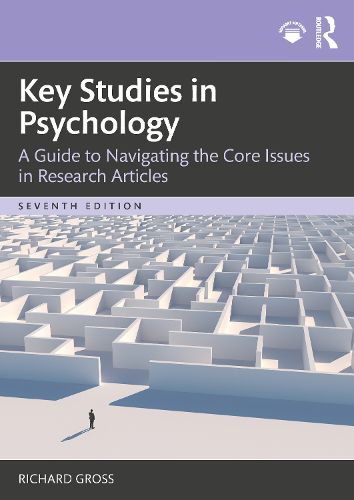Readings Newsletter
Become a Readings Member to make your shopping experience even easier.
Sign in or sign up for free!
You’re not far away from qualifying for FREE standard shipping within Australia
You’ve qualified for FREE standard shipping within Australia
The cart is loading…






Now in its seventh edition, this book brings together 30 classic and contemporary studies in psychology to show students how to analyse key studies in the field, understand how classic theories are constantly revisited by modern researchers, and develop the skills required to write about psychology in exams and essays.
Pulled from each of the five major areas of psychology - cognitive, developmental, individual differences, social, and biopsychology - the studies cover such topics as language and memory, attachment, mental disorder, bystander intervention, and near-death experiences. Each chapter looks at the background and context to a classic and contemporary study and provides a summary of them, before going on to evaluate areas of agreement and convergence, disagreement and divergence, and strengths and weaknesses. Each of these areas focuses on theoretical, methodological/statistical, and ethical issues. Finally, suggestions are made regarding applications, implications, and future research directions. In so doing, the book helps students learn how to deal with primary sources, including how to extract the most relevant information, assess strengths and weaknesses, know what to look for when evaluating a study, and understand how it relates to other research.
Bridging the gap from A-level to degree level study, this is the ideal resource for undergraduate students in psychology.
$9.00 standard shipping within Australia
FREE standard shipping within Australia for orders over $100.00
Express & International shipping calculated at checkout
Now in its seventh edition, this book brings together 30 classic and contemporary studies in psychology to show students how to analyse key studies in the field, understand how classic theories are constantly revisited by modern researchers, and develop the skills required to write about psychology in exams and essays.
Pulled from each of the five major areas of psychology - cognitive, developmental, individual differences, social, and biopsychology - the studies cover such topics as language and memory, attachment, mental disorder, bystander intervention, and near-death experiences. Each chapter looks at the background and context to a classic and contemporary study and provides a summary of them, before going on to evaluate areas of agreement and convergence, disagreement and divergence, and strengths and weaknesses. Each of these areas focuses on theoretical, methodological/statistical, and ethical issues. Finally, suggestions are made regarding applications, implications, and future research directions. In so doing, the book helps students learn how to deal with primary sources, including how to extract the most relevant information, assess strengths and weaknesses, know what to look for when evaluating a study, and understand how it relates to other research.
Bridging the gap from A-level to degree level study, this is the ideal resource for undergraduate students in psychology.